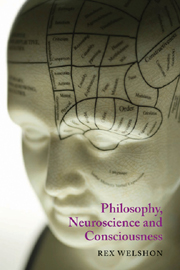Book contents
- Frontmatter
- Contents
- Preface
- Introduction
- PART I PHILOSOPHY AND CONSCIOUSNESS
- PART II NEUROSCIENCE AND CONSCIOUSNESS
- PART III PHILOSOPHY, NEUROSCIENCE AND CONSCIOUSNESS
- 9 Measurement, localization, models and dissociation
- 10 Correlates, realizers and multiple realization
- 11 Microphysical reduction, overdetermination and coupling
- 12 Embodied and embedded consciousness
- Concluding semi-scientific postscript
- Appendix Functional neuroanatomy
- Notes
- Bibliography
- Index
9 - Measurement, localization, models and dissociation
from PART III - PHILOSOPHY, NEUROSCIENCE AND CONSCIOUSNESS
- Frontmatter
- Contents
- Preface
- Introduction
- PART I PHILOSOPHY AND CONSCIOUSNESS
- PART II NEUROSCIENCE AND CONSCIOUSNESS
- PART III PHILOSOPHY, NEUROSCIENCE AND CONSCIOUSNESS
- 9 Measurement, localization, models and dissociation
- 10 Correlates, realizers and multiple realization
- 11 Microphysical reduction, overdetermination and coupling
- 12 Embodied and embedded consciousness
- Concluding semi-scientific postscript
- Appendix Functional neuroanatomy
- Notes
- Bibliography
- Index
Summary
The previous chapters show that there are systematic correlations between conscious processes, events, states and properties and neural events, states, processes and properties and that these correlations are to varying degrees localized to particular cortical regions. The ever-growing mountains of evidence for such localized systematic covariations are grist for the reductionist's mill, suggesting that conscious properties do not just covary with activity in localized neural assemblies but that the latter are neural substrates of the former. It is a relatively quick, albeit contentious, argument from the claim that neural properties and events are substrates of conscious properties and events to the claim that the latter are realized by, and hence reduce to, the former. Consciousness neuroscience thus fulfils its role as the harbinger of reductive physicalism.
Admittedly, the neuroscientific study of conscious properties is not much more than twenty years old, and plenty of gaps remain. Disagreements about evidence strength, data interpretation, experiment replicability and preferability of competing neural models and theoretical frameworks are plentiful. However pointed these shortcomings and disagreements may be, they occur against the background assumption that scientific investigation into consciousness will ultimately be successful in reducing conscious properties to something neural. To think these efforts are missing something essential may seem pig-headed. This view is mistaken, and many of the best reasons for thinking so come from philosophically minded scientists and scientifically minded philosophers. In this and the next three chapters these reasons are investigated. In this chapter, certain epistemological and conceptual issues are hashed out.
- Type
- Chapter
- Information
- Philosophy, Neuroscience and Consciousness , pp. 196 - 219Publisher: Acumen PublishingPrint publication year: 2010



